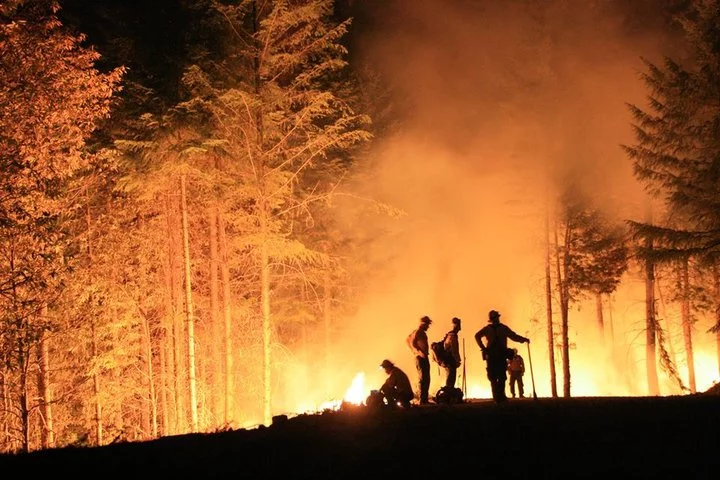File photo: U.S. Forest Service.
A state Senate bill that would expand workers’ compensation coverage for California first responders experiencing post traumatic stress — aimed at addressing what Cal Fire officials call a mental health crisis — has cleared its first legislative hurdle and been sent to the Assembly.
Authored by Sen. John Laird, a Salinas Democrat, the bill is one of a growing number of state initiatives attempting to address the cause of mental health struggles and the difficulty first responders encounter when seeking medical care through state-run insurance.
The bill would extend by seven years a provision in existing state law that says PTSD qualifies as an occupational illness that is covered by workers’ comp for firefighters, police and other first responders. The extension would last through Jan 1, 2032, rather than expiring in 2025. The bill also would add more categories of dispatchers, peace officers, investigators and public security officers in claims for psychological injury.
“Trial by Fire,” a series of CalMatters stories published last summer, revealed how overwork and distress from intensifying wildfires have left Cal Fire crews with increasing PTSD, suicidal thoughts and other mental health problems. Cal Fire Director Joe Tyler told CalMatters that the department faced a mental health crisis and called it his top priority.
Cal Fire does not track suicides or PTSD among its ranks, but many firefighters and their supervisors told CalMatters that the problems are rampant, and described their trauma in detail. Stress from long hours and dangerous work triggers health problems, excessive drinking, drug use and marital discord among firefighters, experts say.
Laird said the CalMatters series “set the context” for his bill and other efforts to address the mental health crisis among first responders. The state has already agreed to a union contract that would reduce Cal Fire firefighters’ 72-hour workweeks to 66 hours beginning in late 2024.
The state firefighters’ union has long called for legislators to plug gaps in workers’ comp coverage that make it difficult for them to receive robust mental health care coverage.
This bill, SB-623, would be a first step toward doing that. But some issues facing first responders are more nuanced and difficult to legislate: encouraging them to report their struggles, while ensuring that their jobs are not threatened. And expanding Cal Fire’s accountability and improving its data reporting, while maintaining individuals’ medical privacy.
The bill “moves things in the right direction,” said Tim Edwards, president of Cal Fire Local 2882. “We support any bill that would bring awareness and funding to help fight the growing number of calls for help.”
Edwards added that other core issues, such as work hours and the lack of treatment centers for mental health issues, still need to be addressed.
The bill passed the Senate on a floor vote of 35-0 on Monday and now moves to the Assembly.
Laird said state officials are reluctant to write checks to fix a problem they cannot quantify, making it critical that first responders share their PTSD experiences with legislators as evidence of the extent of the issue.
“The difficulty has been that the governor wants to know that this is, in fact, necessary,” he said. “We are working with professional firefighters to compile data and first-hand stories. Our goal is to demonstrate that this is vital. That was the thing that was missing, the data.”
Laird said lobbying efforts from the first responders groups were effective because they included personal stories from workers suffering from PTSD and other mental health illnesses. “It makes a difference,” he said. “People can relate.”
The proposed legislation recognizes the stress experienced by dispatchers and 911 operators who may not witness accidents or fires but nonetheless experience trauma and may want to seek counseling.
To qualify for workers’ comp coverage under existing law, a mental health disorder must be diagnosed and cause a disability or need for medical treatment, and the employee must “demonstrate by a preponderance of the evidence” that on-the-job events were the main cause.
Opposition to the bill comes from a coalition of workers’ comp organizations and the state Association of Counties. They say psychological problems are difficult to diagnose and their origins tricky to pinpoint, setting a high bar to ascribe trauma and PTSD as a workplace injury.
“There is no objective basis to evaluate the operation of current law, the need for this expansion, or the impact of stripping away protections for taxpayer funded public entities,” the group told the Senate.
According to an analysis by the Senate Appropriations Committee, “extending coverage of presumptive injuries…would likely result in increased workers compensation costs. The magnitude is unknown.”
The bill’s sponsors are the California Chapter of the National Emergency Number Association, the California Professional Firefighters, the California Statewide Law Enforcement Association and the Peace Officers Research Association of California.
In remarks submitted to the Senate, California Professional Firefighters, which represents state and local fire agencies, said occupational stress among their ranks is well-documented, and that “repeated and chronic exposure to traumatic events and critical incidents increases the risk for post-traumatic stress and other stress-induced symptoms.”
###
CalMatters.org is a nonprofit, nonpartisan media venture explaining California policies and politics.

CLICK TO MANAGE